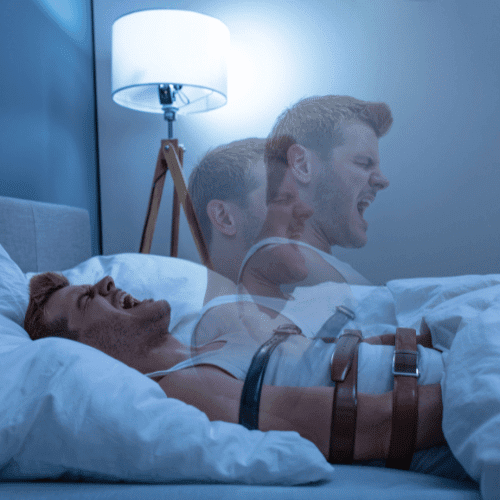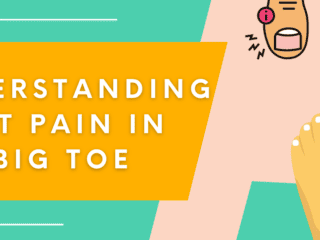At some point, we’ve heard some friends go through what they call sleep paralysis, or maybe you might have experienced it as well. While we can all agree that it sounds terrifying, one might think, is it dangerous to have such an episode? Or even… can sleep paralysis kill you?
Can Sleep Paralysis Kill You?
No, sleep paralysis can not kill you or result in severe health problems. While sleep paralysis can be unsettling, it is not directly harmful and does not pose any danger to your health.
However, since episodes of sleep paralysis can be physically and mentally distressing, it can affect things like sleeping time, quality, and your mental state, leading to various health problems in the long run if not treated properly.Â
What Is Sleep Paralysis?

Sleep paralysis is when you cannot move your muscles or speak as you wake up or fall asleep. It can be scary, but it’s harmless, and most people will only get it a few times in their lifetime.
During sleep paralysis, people are aware of their surroundings but cannot move or speak, but they can still move their eyes and breathe. In some cases, many people even hallucinate, hearing, sensing, or seeing things that aren’t there, usually describing the episode as exhausting and emotionally overwhelming, though these often last up to a few minutes.
Other symptoms include:
- Sense of suffocation/troubled breathing
- Fear
- Panic
- Helplessness
- Tightening around your throat
- Daytime sleepiness (A symptom more associated with narcolepsy)
Causes of Sleep Paralysis
Most studies say that sleep paralysis is caused by a dysfunction of the REM (rapid eye movement) sleep phase, which is the deepest stage of sleep where a person’s brain activity, breathing, heart rate, and blood pressure increase, and the eyes move rapidly while closed. It can be triggered by stress, sleep deprivation, anxiety, narcolepsy, or depression.
During the rapid eye movement (REM) sleep stage, a person will likely have dreams. The brain prevents muscles in your limbs from moving to protect yourself from acting dreams out and hurting yourself, which explains why you feel like you’re paralyzed. Some researchers also believe that sleep paralysis is a mixed state of consciousness that involves both wakefulness and REM sleep.
Risk Factors
People of all ages can experience sleep paralysis at some point in their lives, with the average range when it first occurs among people between 14 and 17 years. It’s also attributed to sleep deprivation associated with a constantly-changing sleep schedule or broken sleeping patterns, which may happen depending on their lifestyles and habits. Studies have also shown that it could be triggered by stress, anxiety, or major life changes.
Similarly, patients diagnosed with post-traumatic stress disorder (PTSD) showed significantly higher rates of sleep paralysis across multiple studies than patients without it.
Other known risk factors include:
- Insomnia – Insomnia could be a contributing factor to the occurrence of sleep paralysis. One study showed that sleep paralysis was related to instances of insomnia and was affected by the person’s overall sleep quality.
- Narcolepsy – Narcolepsy is a long-term condition that causes a person to suddenly fall asleep, and one of its symptoms includes recurrent sleep paralysis. As a result, people with narcolepsy have frequent night awakenings that can be associated with it.
- General anxiety disorder â People with general anxiety disorders have episodes of sleep paralysis, particularly when they catnap during the day.
- Panic disorders – As with anxiety disorders, certain studies have also found a significant co-occurrence between sleep paralysis among people with panic disorders.
- A family history of sleep paralysis – Recent studies claim that the occurrence of sleep paralysis could also be genetic, resulting in a higher risk of episodes among people with a family history of sleep paralysis.
- Excessive drinking – Alcohol consumption can worsen symptoms of sleep paralysis, especially among those who have narcolepsy. It can also cause frequent fatigue and sleep interruptions.
Types Of Sleep Paralysis
Sleep paralysis is classified into two parts:
- Isolated sleep paralysis – Sleep paralysis is considered “isolated” when it occurs without symptoms of narcolepsy or other sleep disorders.
- Recurrent sleep paralysis – The recurrent type of sleep paralysis involves multiple episodes over time. It is common among people suffering from narcolepsy.
In many cases, these two defining types are combined to refer to recurrent isolated sleep paralysis (RISP), where sleep paralysis occurs in someone who does not have narcolepsy.
Can Sleep Paralysis Cause Death?
While sleep paralysis may be terrifying or fatiguing, it cannot kill you. Despite sleep paralysis being a distressing experience, no deaths have been officially reported. The condition is classified as benign and usually does not occur frequently enough to cause serious health problems.
While sleep paralysis may not cause physical harm, episodes of sleep paralysis may substantially shake the sufferer’s mental state because the mind is alert during the hallucinations. Some patients even report waking up crying or gasping for air.
However, some people tend to have more recurrent episodes of sleep paralysis, which sometimes be bothersome and distressing. This results in them developing negative thoughts about going to bed, provoking anxiety around bedtime, making it harder to fall asleep, and affecting overall sleep quality. Lack of adequate sleep can eventually result in excessive sleepiness and numerous health problems.
People who experience sleep paralysis may also struggle to breathe properly during an episode, which can feel like suffocation or being crushed. This particular symptom results from rapid and irregular breathing that occurs in REM sleep.
Overall, an episode of sleep paralysis, while not dangerous or fatal, can still negatively impact a person’s physical and mental state, potentially triggering severe stress and anxiety and resulting in more health problems.
Dealing With Sleep Paralysis
How To Wake Up From A Sleep Paralysis Episode
There is no established way to wake up from an episode of sleep paralysis. However, many people who’ve experienced it attest that trying to wiggle their fingers and toes helps them wake up more quickly from an episode. Other distractions like reverse counting may also help.
During an episode, one should also try to keep as calm as possible, resist the urge to panic, and pay attention to breathing patterns. In most cases, episodes end on their own but occasionally are interrupted by another person’s touch or voice.
Going Back To Sleep After An Episode
Should you wish to go back to sleep after experiencing a sleep paralysis episode, it may be challenging at first to rock yourself back to sleep. But one can employ the following methods.
- Create a calming atmosphere – A soothing room ambiance can help you get back to sleep. You could open an air conditioner, set the room temperatures lower, and play relaxing music.
- Do breathing exercises – Doing the 4-7-8 breathing exercise method can help someone fall back asleep. It is done by closing the mouth and quietly inhaling through the nose (by mentally counting up to four), holding the breath for seven, exhaling through the mouth, and making a whoosh sound for eight. This process is done four times or as needed.
Preventing Sleep Paralysis Episodes
There isn’t much one can do to prevent future sleep paralysis episodes from happening. But there are steps you can take to lower your risk, and one of the best ways to avoid sleep paralysis is to improve the quality of your sleep.
- Sleeping a full 6-8 hours – Try to get 6 to 8 hours of sleep a day and avoid sleeping on the back or the stomach to lower the risk of sleep paralysis, which stems from a lack of proper sleep.
- Establish a fixed sleeping pattern – Follow a consistent sleeping routine by going to bed at roughly the same time each night and getting up at the same time each morning. That way, it helps set the circadian rhythm well and accustom your body to sleep better.
- Do regular exercise â Doing evening exercises, contrary to what one may initially think, doesn’t affect sleep, but it can help people fall asleep faster and spend more time in a deeper sleep.
- Abstain from stimulants – Avoid taking anything alcoholic or caffeinated since the substances can last for hours in the body and interfere with sleep quality.
- Avoid using gadgets before bedtime – Setting aside gadgets like phones, tablets, or computers 2 to 3 hours before bedtime can help prepare the body to sleep better. The blue light emitted from electronic devices disrupts the circadian rhythm, affects sleep hormone production, and even induces stress.
Treating Sleep Paralysis
Most people need no treatment for sleep paralysis, but for those who seek treatments, the first step is to talk with a doctor, specifically a sleep specialist, to identify and address underlying problems contributing to the frequency or severity of episodes. Treatment options, for example, could involve treatment for narcolepsy or sleep apnea management.
Testing options may include the following:
- Polysomnogram – Otherwise known as overnight sleep study, this test monitors a person’s breathing, heartbeat, and brain activity while sleeping. It helps observe a sleep paralysis episode or detect issues like sleep apnea.
- Multiple sleep latency tests (MSLT) – In this test, a person is given 4-5 opportunities to sleep every two hours during normal wake time, then the specialist uses the test to measure the extent of daytime sleepiness and how quickly REM sleep begins.
Therapy Options
Cognitive behavioral therapy is a type of talk therapy that dispels negative thoughts and emotions that deviate from sleep. Studies show that it’s effective in decreasing the frequency of sleep paralysis, minimizing anxiety and sleeping problems, promoting better brain function and mood during the day, and increasing the sense of control during episodes.
While it’s proven to help treat anxiety and PTSD symptoms, more research is needed to validate its effectiveness in managing and lessening the occurrence of sleep paralysis episodes.
Medications
Physicians and sleep specialists often prescribe tricyclic antidepressant medicines like imipramine and clomipramine, which best help manage and lessen further sleep paralysis occurrences and prevent hallucinations that may occur with each episode. Additionally, their antidepressant nature allows them to have muscle-relaxant properties that help promote sleep.
Takeaway
Sleep paralysis can be a stressful, distressing experience, but it’s only and not life-threatening.
But while there is no quick remedy for sleep paralysis, implementing lifestyle changes and habits can help you mitigate or lessen the frequency of these episodes.
Setting a sleeping schedule, reducing intake of stimulants, and regular exercise may help you better cope with sleep paralysis. Avoiding alcohol and caffeinated beverages and setting aside electronic gadgets before bedtime can also help you sleep better.
While experiencing sleep paralysis, it’s important to stay calm, take slow deep breaths, center your mind, and try to wiggle fingers/toes to snap you out of it.
However, suppose you’re having persistent episodes of sleep paralysis or currently experiencing further health problems. In that case, it’s best to consult a board-certified sleep specialist or your healthcare provider to facilitate better recovery.








